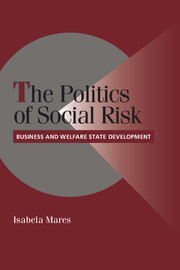Summary
During the past four decades, research on the development of modern welfare states has been dominated by theories stressing the political centrality of class conflict. Marxist or neo-Marxist studies in the 1960s, power resource scholars in the 1970s, and more recent studies exploring the political determinants of various “welfare regimes” have characterized the political struggles over the enactment of a new social policy as a zero-sum conflict among labor-based political organizations and political associations representing the interests of capital (Stephens 1979, Esping-Andersen and Korpi 1985).
This literature has been premised on a set of assumptions that, at first, seem intuitively plausible. The first critical assumption made by these studies is that “the welfare state is a class issue. Logically and historically, its principal proponents and defenders are movements of the working class” (Shalev 1983: 319). Social policy compensates labor for its disadvantaged position in the labor market by reducing the income losses experienced by workers during employment-related risks. Using the terminology formulated by these studies, social policies “decommodify” workers: they weaken the dependence of workers on the labor market alone as a source of income (Esping-Andersen 1990: 20).
The second critical assumption underpinning this research is that employers have resisted the expansion of policies of social insurance and that they opposed the introduction of a new social policy. As Huber and Stephens argue, “business associations, like their political allies in the secular right, preferred as little legislation and as much flexibility in social and labor market policy as possible” (Huber and Stephens 2001: chap. 5). Most scholars justify the assumption of business opposition to social insurance by invoking both financial and labor market considerations of firms. Employers, these studies argue, oppose social policies because these are financed by payroll taxes and thus raise the nonwage labor costs of firms. Similarly, most studies assume that one of the goals of employers is to lower the bargaining power of workers. Consequently, firms will oppose policies that maintain income streams in the event of employment interruptions because these policies raise the reservation wages of their employees.
- Type
- Chapter
- Information
- The Politics of Social Risk , pp. 249 - 266Publisher: Cambridge University PressPrint publication year: 2003



